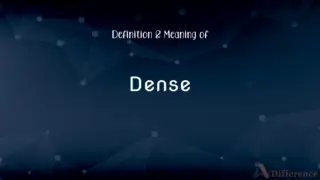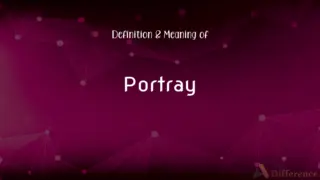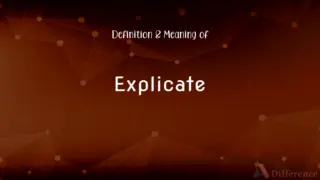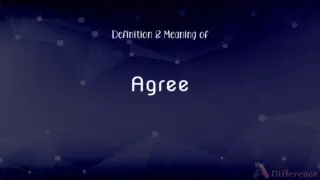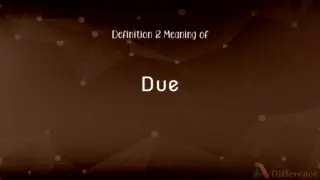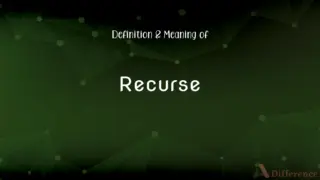Provoke Definition and Meaning
By Maham Liaqat & Urooj Arif — Published on April 10, 2024
Provoke means to stimulate or give rise to a reaction or emotion, typically a strong or unwelcome one, in someone. e.g., The controversial movie is likely to provoke anger among certain audiences.

Table of Contents
Provoke Definitions
To incite or stir up (an emotion or reaction).
His comments were meant to provoke laughter, but they fell flat.
To bring about or instigate (an event or situation).
The artist's work aims to provoke thought and debate.
To challenge or confront in a way that requires a response.
The debate question was designed to provoke insightful answers.
To stimulate or give rise to (a physical or biological response).
Certain foods can provoke allergic reactions in some people.
To elicit or induce (a reaction or emotion).
The play's dramatic ending is guaranteed to provoke tears.
To deliberately annoy or anger someone.
She knew exactly how to provoke her brother into an argument.
To cause a response or action, especially a negative one.
The new policy could provoke widespread protests.
To call forth (a particular quality or reaction).
The teacher's methods provoke curiosity in her students.
To incite or encourage someone to do something, especially something rash.
Peer pressure can often provoke teenagers into making poor decisions.
To incite to anger or resentment
Taunts that provoked their rivals.
To stir to action or feeling
A remark that provoked me to reconsider.
To give rise to; bring about
A miscue that provoked laughter.
News that provoked an uproar.
To bring about deliberately; induce
Provoke a fight.
(transitive) To cause someone to become annoyed or angry.
Don't provoke the dog; it may try to bite you.
(transitive) To bring about a reaction.
(obsolete) To appeal.
To call forth; to call into being or action; esp., to incense to action, a faculty or passion, as love, hate, or ambition; hence, commonly, to incite, as a person, to action by a challenge, by taunts, or by defiance; to exasperate; to irritate; to offend intolerably; to cause to retaliate.
Obey his voice, provoke him not.
Ye fathers, provoke not your children to wrath.
Such actsOf contumacy will provoke the HighestTo make death in us live.
Can honor's voice provoke the silent dust?
To the poet the meaning is what he pleases to make it, what it provokes in his own soul.
To cause provocation or anger.
To appeal. [A Latinism]
Call forth (emotions, feelings, and responses);
Arouse pity
Raise a smile
Evoke sympathy
Call forth;
Her behavior provoked a quarrel between the couple
Provide the needed stimulus for
Annoy continually or chronically;
He is known to harry his staff when he is overworked
This man harasses his female co-workers
To arouse to feeling or action; to excite.
The inspiring speech was meant to provoke a sense of unity.
Provoke Snonyms
Stimulate
To raise levels of physiological or nervous activity in (the body or any biological system).
The discussion stimulated interest in the subject.
Agitate
To make someone troubled or nervous.
The thought of public speaking agitates him greatly.
Incite
To encourage or stir up (violent or unlawful behavior).
The leader's speech incited the crowd to take action.
Irritate
To make (someone) annoyed, impatient, or angry.
Constant delays can irritate even the most patient people.
Annoy
To make (someone) a little angry; irritate.
He found her constant questions annoy.
Antagonize
To cause someone to become hostile.
The decision antagonized many people who had supported the plan.
Instigate
To bring about or initiate (an action or event).
They were accused of instigating the riot.
Inflame
To provoke or intensify (strong feelings, especially anger) in someone.
The unfair dismissal inflamed passions among the workers.
Goad
To provoke or annoy (someone) so as to stimulate some action or reaction.
He goaded her into arguing back.
Elicit
To evoke or draw out (a response, answer, or fact) from someone.
The questionnaire was designed to elicit honest feedback.
Provoke Example Sentences
Sometimes, teachers provoke curiosity in students by asking challenging questions.
The novel's controversial themes provoke intense debate among readers.
The coach's harsh words provoke a strong desire to win in the team.
The law was introduced to provoke positive changes in the industry.
Her artwork is designed to provoke emotion and conversation.
The documentary aims to provoke a discussion on climate change.
He tried to provoke a reaction from the audience with his bold statements.
His sarcastic comments were bound to provoke her.
Authorities are concerned that the protest could provoke violence.
He didn't want to provoke an argument, so he stayed silent.
Common Curiosities
Why is it called provoke?
Provoke is called so because it comes from the Latin "provocare," meaning to call forth or challenge, highlighting its nature of eliciting a response or emotion.
How is provoke used in a sentence?
Provoke is used to describe the act of stimulating or inciting a reaction, e.g., His joke didn't provoke the laughter he expected.
How many syllables are in provoke?
Provoke has two syllables.
How do we divide provoke into syllables?
Pro-voke.
What is a stressed syllable in provoke?
The stressed syllable in provoke is "voke."
What is the root word of provoke?
The root word of provoke is the Latin "vocare," meaning to call, with the prefix "pro-" adding the sense of forward or forth.
What is another term for provoke?
Another term for provoke is incite.
What is the first form of provoke?
The first form (base form) of provoke is "provoke."
What part of speech is provoke?
Provoke is a verb.
What is the verb form of provoke?
Provoke itself is the verb form.
What is the pronunciation of provoke?
Provoke is pronounced as /prəˈvoʊk/.
What is the singular form of provoke?
The singular form is provoke, as it is a verb and does not change form based on number.
What is the second form of provoke?
The second form (past simple) of provoke is "provoked."
Is provoke a collective noun?
No, provoke is not a collective noun; it is a verb.
Is the word provoke a Gerund?
The gerund form of provoke is "provoking."
Is the word “provoke” a Direct object or an Indirect object?
Provoke can act upon a direct object, e.g., "He provoked me."
Which determiner is used with provoke?
As provoke is a verb, determiners are not typically used with it in its basic form.
Which vowel is used before provoke?
This question is not applicable to provoke as it is a verb; prepositions, not vowels, may precede verbs.
What is the plural form of provoke?
Provoke does not have a plural form as it is a verb; verbs change form based on tense, not number.
Is provoke an adverb?
No, provoke is not an adverb.
What is the opposite of provoke?
The opposite of provoke is calm or soothe.
Is provoke a vowel or consonant?
The word provoke starts with a consonant sound.
Is provoke a countable noun?
Provoke is not a noun; it is a verb.
What is the third form of provoke?
The third form (past participle) of provoke is "provoked."
Is provoke an abstract noun?
No, provoke is not a noun; it is a verb, so it cannot be an abstract noun.
Is provoke a negative or positive word?
Provoke is usually considered negative due to its association with eliciting unwelcome reactions or emotions.
Is the provoke term a metaphor?
Provoke can be used metaphorically to describe inducing responses not just in direct confrontations but in broader contexts.
Is the word provoke imperative?
Yes, provoke can be used in the imperative mood as a command, e.g., "Provoke thought with your art."
Which conjunction is used with provoke?
Conjunctions like "and" or "but" can be used in sentences with provoke to connect clauses.
Which article is used with provoke?
Articles are not used directly with the verb provoke; articles may be used with nouns related to the verb.
Is provoke a noun or adjective?
Provoke is a verb.
Which preposition is used with provoke?
Prepositions such as "into" or "to" can be used with provoke, e.g., "provoke someone to action."
Share Your Discovery

Previous Term
Uneasy Definition and Meaning
Next Term
Bide Definition and MeaningAuthor Spotlight
Written by
Maham LiaqatCo-written by
Urooj ArifUrooj is a skilled content writer at Ask Difference, known for her exceptional ability to simplify complex topics into engaging and informative content. With a passion for research and a flair for clear, concise writing, she consistently delivers articles that resonate with our diverse audience.











